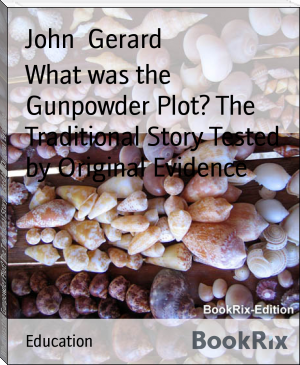What was the Gunpowder Plot? The Traditional Story Tested by Original Evidence - John Gerard (interesting novels in english txt) 📗

- Author: John Gerard
Book online «What was the Gunpowder Plot? The Traditional Story Tested by Original Evidence - John Gerard (interesting novels in english txt) 📗». Author John Gerard
[Addressed, "Mr. Secretary Conway."
Headed, "Touching Wright and his services performed in the damnable plot of the Powder treason."]
APPENDIX H.
Lord Monteagle to King James, (British Museum MSS. Add. 19402, f. 146.)
"MOST gracious Soveraine.--Your maiestyes tender and fatherly love over me, In admonishinge me heartofore, to seake resolution In matter of religion, geves me both occasion, and Incouragement, as humbly to thanke your maiestye for this care of my soules good, so to crave leave of gevinge into your maiestyes hand this accompt, that your wisdome, seinge the course and end of my proceadinges, might rest assured that by the healp of god, I will [live and] dye, In that religion which I have nowe resolved to profes.
"It may please your maiestye therfore to knowe, that as I was breed upp In the Romish religion and walked in that, because I knew no better, so have I not sodainely or lightly made the chaunge, which nowe I desire to be seane In, for I speake, Sir, as before him that shall Judg my soule, I have by praier, for god his gidance, and with voues to him, to walk in that light he should shew me, and by longe carefull and diligent readinge, and conference with lerned men, on both sides, and impartiall examination of ther profes and argumentes, come to discerne the Ignorance I was formerly wrapped In, as I nowe wonder that ether my self, or any other of common understandinge, showld bee so blynded, as to Imbrace that gods trewth, [sic] which I nowe perseyue to be grounded uppon so weake foundations. And as I never could digest all poyntes therin, wherof not few seamed to bee made for gaine and ambition, of the papacye, so nowe I fynde that the hole frame and bodye of that religion (wherin they oppose us) difereth from the platforme, which god him self hath recorded In the holy scriptures, and hath In length of tyme, by the Ignorance and deceiptfulness of men, bene peaced together, and is now maintayned by factious obstinacye, and certain coulerable pretences, such as the wittes and learninge of men, are able to cast uppon any humaine errors, which they list to uphowld. Nether have I left any thinge I doubted of untried or unresolued, becawse I did Intend and desire to so take up the trewth of god, once discouered to me, as neuer to suffer yt to bee questioned any more In my owne consienc. And In all this, Sir, I protest to your maiestye, before almightye god, I have simply and only propounded to my self the trew seruise of god, and saluation of my owne soule, Not gaine, not honor, no not that which I doe most highly valew, your maiestyes fauour, or better opinion of me. Nether on the other side am I affraide of those censures of men whether of the partye I have abandoned, or of others which I shall Incur by this alteration, howldinge yt contentment Innough to my self, That god hath in mercye enlightened my mynde to see his sacred trewth, with desire to serue [the paper here is mutilated].... And rest, your maie[styes] most loyall and obedient servant W. Mownteagle."
Addressed, "To the Kinge his most excellent Maiestye."
From the absence of any allusion to the Powder Plot and its "discovery," it appears certain that this letter must have been written previously to it.
On August 1st, 1609, Sir Wm. Waad wrote to Salisbury that the disorders of Lord Monteagle's house were an offence to the country. At this period he appears to have been suspected of concealing Catholic students from St. Omers. [Calendar of State Papers.]
APPENDIX I.
Epitaph in St. Anne's, Aldersgate. [Maitland, London (1756), p. 1065.]
"Peter Heiwood, younger son of Peter Heiwood, one of the Counsellors of Jamaica, ... Great Grandson to Peter Heiwood of Heywood in the County Palestine of Lancaster; who apprehended Guy Faux with his dark Lanthorn; and for his zealous prosecution of Papists, as Justice of Peace, was stabbed in Westminster-Hall by John James, a Dominican Friar, An. Dom. 1640. Obiit Novem. 2. 1701.
Reader, if not a Papist bred Upon such Ashes gently tread."
It is to be presumed that the person who died in 1701 is not the same who was stabbed in 1640, or who discovered Guy Faukes in 1605.
The Dominican records contain no trace of any member of the Order named John James, nor does so remarkable an event as the stabbing of a Justice of Peace in Westminster Hall appear to be chronicled elsewhere.
Peter Heywood, J.P. for Westminster, was active as a magistrate as late as December 15th, 1641. [Calendar of State Papers.]
APPENDIX K.
The Use of Torture.
THERE can be no doubt that torture was freely employed to extract evidence from the conspirators and others who fell into the hands of the government.
The Earl of Salisbury, in his letter to Favat, of December 4th, 1605, clearly intimates that this was the case, when he complains "most of the prisoners have wilfully forsworn that the priests knew anything in particular, and obstinately refuse to be accusers of them, yea, what torture soever they be put to."
About the middle of November, Lord Dunfermline wrote to Salisbury [Dom. James I. xvi. 81] recommending that the prisoners should be confined apart and in darkness, that they should be examined by torchlight, and that the tortures should be slow and at intervals, as being thus most effectual.
There is every reason to believe that the Jesuit lay-brother, Nicholas Owen, alias Littlejohn, actually died upon the rack. [Vide Father Gerard's Narrative of the Gunpowder Plot, p. 189.]
Finally we have the king's instructions as to Faukes [Gunpowder Plot Book, No. 17]. "The gentler tortours are to be first usid unto him, et sic per gradus ad ima tenditur,[458] and so God speede your goode worke."[459] Guy's signature of November 9th is sufficient evidence that it was none of the "gentler tortours" which he had endured.
In the violently Protestant account of the execution of the traitors,[460] we read: "Last of all came the great Devil of all Faukes, who should have put fire to the powder. His body being weak with torture and sickness, he was scarce able to go up the ladder, but with much ado, by the help of the hangman, went high enough to brake his neck with the fall."
APPENDIX L.
Myths and Legends of the Powder Plot.
AROUND the Gunpowder Plot has gathered a mass of fabulous embellishment too curious to be passed over in silence. This has chiefly attached itself to Guy Faukes, who, on account of the desperate part allotted to him has impressed the public mind far more than any of his associates, and has come to be erroneously regarded as the moving spirit of the enterprise.
One of the best authenticated facts regarding him is that when apprehended he was booted and spurred for a journey, though it is usually said that he was to have travelled by water.
There is, however, a strange story, told with much circumstantiality, which gives an elaborate but incomprehensible account of a tragic underplot in connection with him. This is related at considerable length in a Latin hexameter poem, Venatio Catholica, published in 1609, in the History of the Popish Sham Plots, and elsewhere. According to this tangled tale the other conspirators wished both to get rid of Faukes, when he had served their purpose, and to throw the suspicion of their deed upon their enemies, the Puritans. To this end they devised a notable scheme. A certain Puritan, named Pickering, a courtier, but a godly man, foremost amongst his party, had a fine horse ("Bucephalum egregium"). This, Robert Keyes, his brother-in-law, purchased or hired, and placed at the service of Faukes for his escape. The steed was to await him at a certain spot, but in a wood hard by assassins were to lurk, who, when Guy appeared, should murder him, and having secured the money with which he was furnished, should leave his mangled corpse beside the Bucephalus, known as Mr. Pickering's. Thus Faukes would be able to tell no tales, and--though it does not appear why--suspicion would be sure to fall on the Puritan, and he would be proclaimed as the author of the recent catastrophe.
"Hoc astu se posse rati convertere in hostes Flagitii infamiam, causamque capessere vulgo Qua Puritanos invisos reddere possent, Ut tantæ authores, tam immanis proditionis. Cognito equo, et facta (pro more) indagine cædis,





Comments (0)